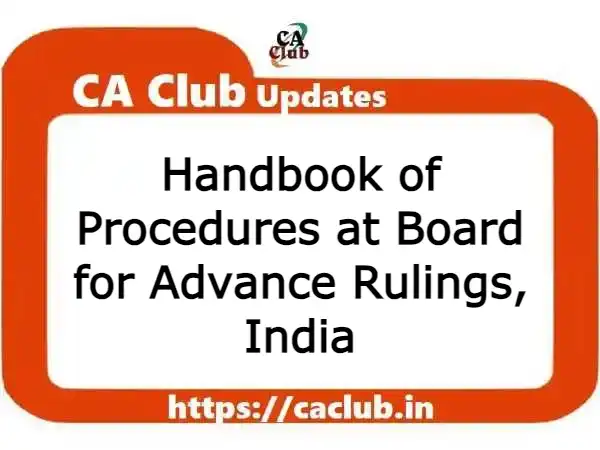The “Handbook on Advance Rulings” released by CBDT serves as a comprehensive overview of the Advance Rulings framework in India under the Income-tax Act, 1961. It covers both legal and procedural aspects, along with relevant provisions of the Income-tax Act/Rules, notifications from Central Board of Direct Taxes/Government of India. Advance Rulings have an important place in providing tax certainty while mitigating challenging issues associated with taxation.
An investor located outside India can gain clarity on their income tax obligations prior to committing to an investment in the country. Additionally, resident entities can also apply for an advance determination of their tax responsibilities related to transactions worth Rs 100 crore or more, bypassing potential prolonged legal disputes. This Scheme, offering advance verdict on tax matters, is extended to Public Sector Undertakings as well. This enables them to obtain preliminary rulings on factual or legal inquiries before they are addressed by any income tax authority or Appellate Tribunal.
Globalization and Advance Rulings
The era of globalization has tightly interwoven the world economies, leading to the emergence of multinational enterprises (MNEs) conducting business across multiple jurisdictions and engaging in cross-border transactions. Consequently, this has given rise to challenges concerning taxation and other aspects of these transactions. Among the primary concerns of various jurisdictions has been the avoidance of double taxation. To address this, countries around the world have entered into Double Taxation Avoidance Agreements (DTAAs). India has also entered into DTAAs with numerous nations.
Jurisdictions have been proactive in providing tax predictability to non-residents, often employing advance rulings as a mechanism. The concept of Advance Rulings, which entails authoritative written decisions on the tax implications of transactions, is prevalent in many countries, albeit with variations.
Inception and Implementation of Advance Rulings in India
In India, the concept of Advance Ruling was initially proposed by the Wanchoo Committee in the mid-1970s and was subsequently introduced through the Finance Act of 1993. This established an independent high-level adjudicatory body, led by a retired judge of the Supreme Court, known as the Authority for Advance Rulings (AAR).
Amendments in the Income Tax Act
Later on, the Finance Act of 2021 brought about amendments to the Income-tax Act, 1961. In line with these changes, the Government of India, through Income Tax Notification 96/2021 dated 1st September, 2021, established three Boards for Advance Rulings (BAR). Each BAR comprises two senior officers of Chief Commissioner of Income-tax rank or higher. Subsequently, through Notification 97/2021 dated 1st September, 2021, the commencement date for the relevant provisions regarding the operationalization of BAR was designated as 1st September, 2021.
e-Advance Rulings Scheme, 2022/2023
Furthermore, the e-advance rulings Scheme, 2022, was introduced via Notification 07/2022 dated 18th January 2022, and it was subsequently amended by the e-advance ruling (amendment) Scheme, 2023, as per Notification 38/2023 dated 12th June 2023. Alongside these changes, relevant rules and forms of the Income-tax Rules, 1962, were also revised through Notifications 49/2022 dated 5th May 2022 and 37/2023 dated 12th June 2023. The substantive legal provisions concerning BAR are encapsulated in Chapter XIX-B of the Act (sections 245N to 245W), while the procedural guidelines are outlined in rules 44E and 44FA of the Rules.
The Role of Board for Advance Rulings (BAR)
The aim of this handbook is to furnish insights into the interconnected legal provisions and procedures. In the realm of direct tax laws, the authority to issue advance rulings rests with BAR. The design ensures that the process remains straightforward, cost-effective, expedited, and technology-driven. BAR possesses the full authority of a civil court under the Code of Civil Procedure, 1908, as referred to in section 131 of the Act. This empowers BAR to issue rulings on specific legal and factual questions.
Application Forms for Seeking Advance Tax Rulings
Under section 245Q(1) of the Income-tax Act, 1961, various application forms pertain to different applicants seeking advance rulings. Form 34C is designed for non-resident applicants, while Forms 34D and 34DA are for resident applicants transacting with non-residents, and those engaged in specific transactions, respectively. Additionally, Form 34E is specific to certain resident categories as stipulated by Central Government directives. Lastly, any person seeking an advance ruling should utilize Form 34EA. All these forms are appended to this handbook and available on the website of the Income Tax Department..
Disclaimers
It should be noted that the CBDT has provided a disclaimer that this handbook should not be treated as an exhaustive representation of the law and procedures. In instances of uncertainty, reference should be made to the relevant provisions of the Income Tax Act, Rules, notifications, circulars, etc., issued periodically.
Conclusion
This handbook provides insight into India’s Advance Rulings system as an essential component of India’s Income-tax Act. This guide highlights its simplicity, cost-effectiveness, expeditiousness and technology-driven nature of processes at Board for Advance Rulings (BAR). While not exhaustive, this handbook serves as a valuable reference when navigating Income Tax Act, Rules and official notifications.
Handbook on Procedures at Board for Advance Rulings in India (2023 Edition)
Related Posts:
e-Advance Rulings Scheme, 2023: Incorporation of ‘Majority Rule’
CBDT Simplifies Process for Advance Ruling Applications
CBDT notifies the ‘e Advance Rulings Scheme 2022’, as part of ‘Faceless Schemes’
